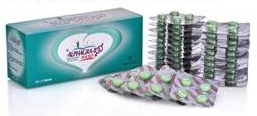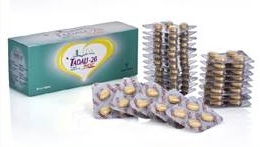Aquazide Tablets (Generic Hydrochlorothiazide) - Product Information
Aquazide Tablets (Generic Hydrochlorothiazide) are used alone or together along with other medicines for the treatment of high blood pressure. Generic Hydrochlorothiazide tablets are also used as adjunctive therapy for the treatment of edema associated with congestive heart failure, hepatic cirrhosis, corticosteroid and estrogen therapy, premenstrual tension with edema and in edema of renal origin. Hydrochlorothiazide is a diuretic and antihypertensive. Diuretics increase the amount of urine produced by the kidneys and are sometimes called water pills.
Hydrochlorothiazide belongs to class of medicines called diuretics or 'water pills'. It causes the lowering of blood pressure by making the kidneys to expel unneeded water and salt from the body into the urine.
The Generic equivalent of Hydrochlorothiazide, Aquazide tablets are manufactured by Sun Pharmaceutical Industries Limited in the strengths of 12.5 mg and 25 mg.
We also have in stock Generic Micardis (Sartel Tablets) which is usually used together with Aquazide (Generic Hydrochlorothiazide tablets) to enhance the antihypertensive effect in the treatment of more severe forms of hypertension.
Name of the Drug
We supply original Aquazide tablets manufactured by Sun Pharmaceutical Industries Limited, India.
Manufacturer of Aquazide Tablets
Sun Pharmaceutical Industries Limited, India
Website: www.sunpharma.com
Active Ingredient present in Aquazide Tablets
The active ingredient present in Aquazide tablets is Hydrochlorothiazide. Each Aquazide tablets contains 12.5mg or 25 mg of Hydrochlorothiazide.
Uses of Generic Hydrochlorothiazide (Aquazide 12.5 mg and 25 mg tablets by Sun Pharmaceutical Industries Limited)
Aquazide (Generic Hydrochlorothiazide Tablets) is used to treat high blood pressure (essential arterial hypertension). Lowering high blood pressure helps prevent strokes, heart attacks, and kidney problems. Hydrochlorothiazide belongs to a class of medicines known as diuretics or water pills. It works by causing you to make more urine. This helps your body get rid of extra salt and water.This medicine also reduces extra fluid in the body (edema) caused by conditions such as heart failure, liver disease, or kidney disease. This can lessen symptoms such as shortness of breath or swelling in your ankles or feet.
Hydrochlorothiazide tablets are also used to treat fluid retention in the tissues as a result of disease of the heart, liver and kidneys (cardiac, hepatic and renal oedemas), high calcium content of the urine and prevention of calcium-containing kidney stones and hormonal kidney disease characterised by increased urination and a feeling of thirst (renal diabetes insipidus).
Hydrochlorothiazide Tablets (Aquazide) - Dosage
The dosage of Hydrochlorothiazide tablets has to be individualized as per the therapeutic response of the patient being treated. The lowest possible dosage should be used which is required to meet the treatment objectives.
Adult Dosage for Treatment of Edema:
The recommended dosage is 25 mg to 100 mg daily as a single or divided dose. Many patients being treated for edema respond to intermittent therapy, i.e., administration of Aquazide tablets on alternate days or on 3 to 5 days each week. In Patients following an intermittent schedule, excessive response and the resulting undesirable electrolyte imbalance are less likely to occur.
Control of Hypertension in Adults:
The usual starting dose of Aquazide in adults is 25 mg daily given as a single dose. The dose may be increased to 50 mg daily, given as a single or two divided doses if the desired response is not obtained. Doses more than 50 mg are frequently associated with marked reductions in serum potassium. Patients normally do not require doses in excess of 50 mg of hydrochlorothiazide daily when used together with other antihypertensive agents.
For Edema in Adults:
The usual adult dosage is 25 to 100 mg daily as a single or divided dose. Many patients with edema respond to intermittent therapy, i.e., administration on alternate days or on three to five days each week. With an intermittent schedule, excessive response and the resulting undesirable electrolyte imbalance are less likely to occur.
How to Use Hydrochlorothiazide Tablets (Aquazide)
Take Hydrochlorothiazide tablets by mouth as directed by your doctor, usually once daily in the morning with or without food. It is best to avoid taking this medication within 4 hours of your bedtime to prevent having to get up to urinate.
The dosage is based on your medical condition and response to treatment.
Use this medication regularly to get the most benefit from it. To help you remember, take it at the same time each day. It is important to continue taking this medication even if you feel well. Most people with high blood pressure do not feel sick.
Hydrochlorothiazide Tablets - Contraindications
Hydrochlorothiazide tablets (Aquazide) are contraindicated in patients with a hypoersensitivity to Hydrochlorothiazide or any inactive ingredient present in Aquazide tablets. It is also contraindicated in cases of Anuria (the nonpassage of urine or passage of less than 100 ml of urine in a day).
Hydrochlorothiazide Side Effects
The common possible side effects of Hydrochlorothiazide tablets are Upset stomach, dizziness, or headache which usually occurs as your body adjusts to the medication. If any of these effects persist or worsen, tell your doctor or pharmacist as soon as possible.
To reduce the risk of dizziness and lightheadedness, get up slowly when rising from a sitting or lying position.
Remember that your doctor has prescribed Aquazide because he or she has judged that the benefit to you is greater than the risk of side effects. Many people using this medication do not have serious side effects.
This medication may cause a serious loss of body water (dehydration) and salt/minerals. Tell your doctor right away if any of these unlikely but serious side effects occur: muscle cramps/weakness, slow/fast/irregular heartbeat, unusual decreased urination, unusual dry mouth/thirst, decrease in vision, eye pain.
A very serious allergic reaction to this drug is rare. However, get medical help right away if you notice any symptoms of a serious allergic reaction, including: rash, itching/swelling (especially of the face/tongue/throat), severe dizziness, trouble breathing.
The following side effects have been reported and, within each category, are listed in order of decreasing severity.
Body as a Whole: Weakness.
Cardiovascular: Hypotension including orthostatic hypotension (may be aggravated by alcohol, barbiturates, narcotics or antihypertensive drugs).
Digestive: Pancreatitis, jaundice (intrahepatic cholestatic jaundice), diarrhea, vomiting sialadenitis, cramping, constipation, gastric irritation, nausea, anorexia.
Hematologic: Aplastic anemia, agranulocytosis, leukopenia, hemolytic anemia, thrombocytopenia.
Hypersensitivity: Anaphylactic reactions, necrotizing angiitis (vasculitis and cutaneous vasculitis), respiratory distress including pneumonitis and pulmonary edema, photosensitivity, fever, urticaria, rash, purpura.
Metabolic: Electrolyte imbalance, hyperglycemia, glycosuria, hyperuricemia.
Musculosketetal: Muscle spasm.
Nervous System/Psychiatric: Vertigo, paresthesias, dizziness, headache, restlessness.
Renal: Renal failure, renal dysfunction, interstitial nephritis.
Skin: Erythema multiforme including Stevens-Johnson syndrome, exfoliative dermatitis including toxic epidermal necrolysis, alopecia.
Special Senses: Transient blurred vision, xanthopsia.
Urogenital: Impotence.
Whenever adverse reactions are moderate or severe, thiazide dosage should be reduced or therapy withdrawn.
This is not a complete list of possible side effects of Hydrochlorothiazide tablets. If you notice other effects not listed above, contact your doctor or pharmacist.
Storage of Hydrochlorothiazide Tablets
Store Hydrochlorothiazide tablets (Aquazide) in a closed container at room temperature, away from heat, moisture, and direct light. Keep from freezing. Keep the medicine out of the reach of children and pets.
Warnings & Precautions When Using Hydrochlorothiazide Tablets
Before taking hydrochlorothiazide, tell your doctor or pharmacist if you are allergic to it; or if you have any other allergies. This product may contain inactive ingredients (such as sulfites found in some brands), which can cause allergic reactions or other problems. Talk to your pharmacist for more details.
Before using this medication, tell your doctor or pharmacist your medical history, especially of: diabetes, gout, kidney disease, liver disease, lupus.
This drug may make you dizzy. Do not drive, use machinery, or do any activity that requires alertness until you are sure you can perform such activities safely. Limit alcoholic beverages.
Severe sweating, diarrhea, or vomiting can increase the risk for a serious loss of body water (dehydration). Report prolonged diarrhea or vomiting to your doctor. To prevent dehydration, drink plenty of fluids unless your doctor directs you otherwise.
If you have diabetes, hydrochlorothiazide may affect your blood sugar levels. Check your blood sugar levels regularly as directed by your doctor. Your doctor may need to adjust your diabetes medication, exercise program, or diet.
This drug may decrease your potassium levels. Ask your doctor about foods high in potassium (such as bananas, orange juice) or about using a salt substitute containing potassium. A potassium supplement may be prescribed by your doctor.
This medication may make you more sensitive to the sun. Avoid prolonged sun exposure, tanning booths, and sunlamps. Use a sunscreen and wear protective clothing when outdoors.
Before having surgery, tell your doctor or dentist about all the products you use (including prescription drugs, nonprescription drugs, and herbal products).
Older adults may be more sensitive to the effects of this drug, especially dizziness.
Use with caution in severe renal disease. In patients with renal disease, thiazides may precipitate azotemia. Cumulative effects of the drug may develop in patients with imparied renal function.
Thiazides should be used with caution in patients with impaired hepatic function or progressive liver disease, since minor alterations of fluid and electrolyte balance may precipitate hepatic coma.
Thiazides may add to or potentiate the action of other antihypertensive drugs.
Sensitivity reactions may occur in patients with or without a history of allergy or bronchial asthma.
The possibility of exacerbation or activation of systemic lupus erythematosus has been reported.
Lithium generally should not be given with diuretics.
Acute Myopia and Secondary Angle-Closure Glaucoma: Hydrochlorothiazide, a sulfonamide, can cause an idiosyncratic reaction, resulting in acute transient myopia and acute angle-closure glaucoma. Symptoms include acute onset of decreased visual acuity or ocular pain and typically occur within hours to weeks of drug initiation. Untreated acute angle-closure glaucoma can lead to permanent vision loss. The primary treatment is to discontinue hydrochlorothiazide as rapidly as possible.
Hydrochlorothiazide Tablets Overdose
The most common signs and symptoms observed in case of an overdose of Hydrochlorothiazide tablets are those caused by electrolyte depletion (hypokalemia, hypochloremia,hyponatremia) and dehydration resulting from excessive diuresis. If digitalis has also been administered, hypokalemia may accentuate cardiac arrhythmias.
In the event of Aquazide overdosage, symptomatic and supportive measures should be employed. Emesis should be induced or gastric lavage performed in case required.
Dehydration, electrolyte imbalance, hepatic coma and hypotension should be corrected by using established procedures. In case it is required, give oxygen or artificial respiration for respiratory impairment.The degree to which hydrochlorothiazide is removed by hemodialysis has not been established
Aquazide Tablets During Pregnancy
Hydrochlorothiazide (Aquazide tablets) has been classified by the US FDA as Pregnancy Category B. Animal studies in which Hydrochlorothiazide was orally administered to pregnant mice and rats at doses of 1000 mg/kg/day, have revealed no evidence of harm to the fetus.
There are, however, no adequate and well-controlled studies in conducted in pregnant women. Thiazides cross the placental barrier and appear in cord blood. When Hydrochlorothiazide is used in pregnancy or in women of child-bearing age, the potential benefits of the drug should be weighed against the possible hazards to the fetus. The routine use of diuretics in otherwise healthy pregnant women with or without mild edema is not indicated.
Due to the fact that animal reproduction studies are not always predictive of human response, this medicine should be used during pregnancy only if clearly necessary. Discuss the risks and benefits with your doctor.
Hydrochlorothiazide Nursing Implications
Nursing mothers should be made aware that all Thiazides including Hydrochlorothiazide (Aquazide tablets) are excreted in breast milk. Due to the risk of serious adverse reactions in nursing infants, a decision should be made whether to discontinue nursing or to discontinue Hydrochlorothiazide tablets, taking into account the importance of the medicine to the mother. Consult your doctor before breast-feeding since this drug passes into breast milk.
Buy Generic Hydrochlorothiazide Tablets (Aquazide 12.5 mg Pills) Online at Only $0.08 per Pill
You can buy Hydrochlorothiazide tablets online from Clear Sky Pharmacy at a cheap price. Aquazide 12.5 mg and 25 mg pills, manufactured by Sun Pharmaceutical Industries Ltd., India are supplied in a blister strip of 10 tablets. The 12.5 mg tablets cost only $0.08 per unit whereas the 25 mg tablets cost only $0.11 per unit when you place an order for 500 tablets.
Shipping Restriction
There are no Shipping restrictions for this product.







